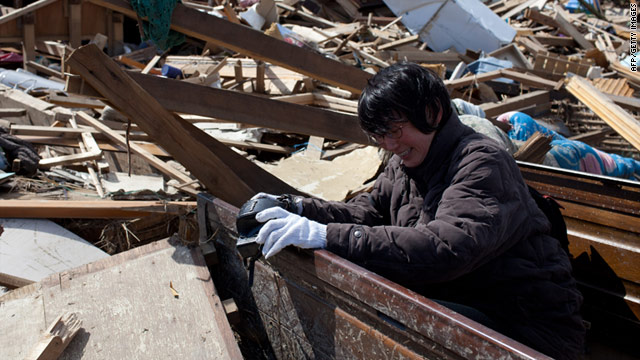Japanese citizens turning in cash found in tsunami zone
April 10, 2011 -- Updated 2030 GMT (0430 HKT)
Chieko Matsukawa finds her camera in her shattered home in Miyagi Prefecture, where personal items lie amid miles of rubble.
STORY HIGHLIGHTS
- Japanese children are taught to return lost items to police
- After three months, the finder can take the cash
- People are waiving their rights to the money when they turn it in
Tokyo (CNN) -- A tsunami that followed a massive earthquake last month may have destroyed some of Japan's structures, but police say the honest practice of turning in lost items, especially cash, remains intact.
Residents have turned in lost cash across the tsunami zone at a much higher rate than usual, the Miyagi Prefectural Police Department tells CNN.
A police spokesman, who asked not to be identified, citing department policy, said he could not specify how much cash has been turned in to lost-and-found offices at police stations. But, he said, of the 24 police stations across Miyagi Prefecture, nine of them are on the Pacific coastline.
Between March 12, the day following the earthquake and tsunami, and March 31, those nine police stations collected 10 times the amount of lost cash collected at the other 15 stations combined.

RELATED TOPICS
Japanese children, from a young age, are taught to turn in any lost items, including cash, to police stations. The cultural practice of returning lost items and never keeping what belongs to a stranger has meant police departments like Tokyo's Metropolitan have an entire warehouse filled with lost shoes, umbrellas and wallets.
In the tsunami zone, where personal items lie amid miles of rubble, it's meant that lost valuables have often gone directly to police, rather than the pocket of the finder.
The lost cash hasn't been easy to handle, the Miyagi Prefectural Police Department says. Money found along with some identification is being returned, but officers have been able to return only 10% of the cash.
Cash that wasn't in a wallet is left unclaimed at the police station. After three months, the person who turned in the cash is able to collect that lost money. But police say people are already waiving their rights to claim the cash when they turn it in.
Unclaimed cash will eventually be sent to the Miyagi Prefectural Government, though police say they do not know how it will be used.
Also found: Hundreds of safes that can't be opened. If the prefectural government allocates funding for opening the safes, police will start doing so.
Prefectural police believe that these safes could contain not only currency, but bank books, stocks and land deeds, which could give a huge boost to the amount of lost money.

No comments:
Post a Comment